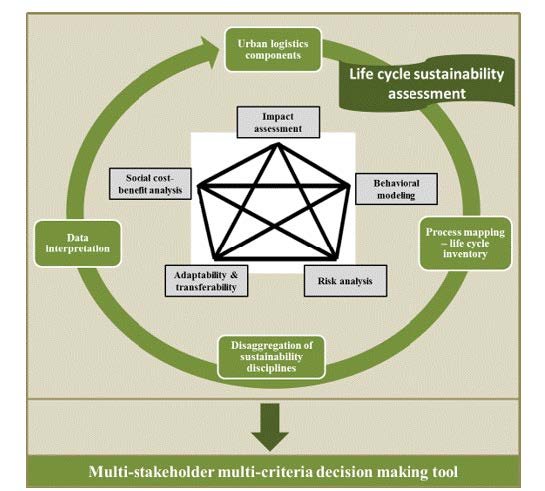United States - European Commission Urban Freight Twinning Initiative: Compendium of Project Summaries, Volume II
Overview of 2018-2019 International Urban Freight Roundtables
| Research | Policy | Pilot | United States |
Smart City Logistics
The objective of the study was to assess the performance of smart urban logistics solutions, policies, and techniques designed specifically for addressing the impacts of last mile operations in a city. For this reason, a common evaluation platform, EVALOG, was developed. The platform enables both ex-ante and ex-post evaluation, allows consideration of multifaceted assessment parameters, provides transparent representation and interpretation of the impacts, and facilitates stakeholder discussion and mutual decision-making. The analysis embeds life cycle sustainability assessment techniques, and each solution may be studied from its creation to its operation, maintenance, and closure. A hierarchical order is used to allocate relevant importance to the main sustainability disciplines (economy and energy, environment, transport and mobility, society) and enablers (policy and measure maturity, social acceptance, user uptake), broken furthermore to criteria and indicators. EVALOG calculates performance indices for each impact area and a global Logistics Sustainability Index for each tested solution per stakeholder category and city case. More specific analyses are performed, which may be also selected by a city; social cost-benefit, adaptability-transferability; and risk and behavioral modeling.

EVALOG multifaceted approach for smart city logistics evaluation.
Source: University of Thessaly.
Project Types
Research, Policy, Pilot.
Period of Performance
June 2015 - May 2018.
Project Sites
London, United Kingdom; Gothenburg, Sweden; Athens, Greece; Graz, Austria; Mechelen, Belgium; Turin, Italy; Bologna, Italy; Venice, Italy; Reggio Emilia, Italy; Barcelona, Spain; Rome, Italy; and Pisa, Italy.
Contact
Eftihia Nathanail
Associate Professor
University of Thessaly
Volos, Greece
ENath@uth.gr
+18 084 656769
Topics Addressed
- Air quality/environment.
- Economic competitiveness.
- Land use interaction.
- Last mile delivery.
- Livability/quality of life.
- Mobility/congestion.
- Modeling.
- Off-hours delivery.
- Safety.
Key Outcomes
EVALOG was used for assessing smart urban logistics solutions in 12 European cities within the context of the H2020 European research project, NOVELOG. The solutions covered both regulatory/incentive driven policies and cooperative schemes for micro consolidation and delivery, shared transportation network and vehicle capacity, and freight transportation planning. The comparative evaluation results indicated that logistics performance improved in all city cases. Higher improvement was observed by the wider public, followed by public authorities and supply chain providers. Better performing solutions were "access by load factor," followed by "multimodality," "ITS for routing," and "smart lockers." The results are city-oriented and depict equally all stakeholders' objectives and priorities.
Stakeholder Involvement
City stakeholders were the main participants in this study. They covered public authorities, supply chain stakeholders, and the general public represented by relevant associations. All participants were involved partners in NOVELOG, which aimed at evaluating solutions tested in the cities. They provided data and opinions throughout the evaluation.